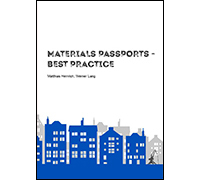Materials Passports - Best Practice

Innovative solutions for a transition to a circular economy in the built environment for a successful transition towards a circular economy in the built environment, reliable and standardized information on material flows and material composition of building products and buildings is needed. As one of the greatest users of resources and producers of waste, the building industry has a central role in making this transition a reality. One element that is currently emerging, which can provide the necessary methodology and data structure for collecting and handling the relevant information, is the so-called materials passport. These digital datasets aim to catalogue and disseminate the circular economy characteristics of building materials, components and products. Materials passports can help to bridge the current information gap and exchange between the relevant actors in the building industry.
This publication provides a guideline for actors along the construction value chain and show the benefits of materials passports and how these can be implemented into general building practice. Furthermore, the publication provides an overview on the types of material and product-related information. Standardised information exchange is one of the keys for a successful transition to a circular economy.
Matthias Heinrich, Werner Lang
Publisher
Technische Universität München, in association with BAMB
ISBN 978-3-941370-96-8